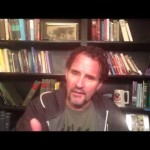We run our website the way we wished the whole internet worked: we provide high quality original content with no ads. We are funded solely by your direct support. Please consider supporting this project.
If God anticipates each possibility perfectly, how does he differ from the “frozen God” of classical theism?
Question: If God anticipates each and every possibility as if each were only possibility, how does God ever experience novelty and adventure? It seems that a God who perfectly anticipated (from all eternity) every single possibility as if it were the only possibility would not differ from the timeless “frozen God” of classical theism
Answer: My claim is not that God experiences every possibility as if it was the only possibility; its rather that God anticipates every possibility as if it were the only possibility. In my view, God’s actual experience of a possibility once it becomes actual always involves an element of newness and additional definiteness — which, I believe, is the main definitional difference between possibility and actuality (I defend this in my book Trinity and Process). This is also how I would account for God’s experience of novelty and adventure. Because an ontological (viz. not merely epistemological) possibility is always one among many, there is always something new in God’s experience when one possibility is actualized (viz. when it transitions from a possibility to an actuality). When an improbable possibility is actualized, God naturally experience something like “surprise” (without, however, any loss of preparedness). When things are at risk, there is an appropriate sense of adventure.
By the way, one problem for classical theists who argue (against open theists!) that God’s knowledge cannot be improved upon by the unfolding of time is that they have difficulty articulating how God’s experience of the actual now differs from God’s foreknowledge of now. Unless something is added by the actual experience, how does God that the “now” is happening? In other words, how does God know what time it is?
Category: Q&A
Tags: Foreknowledge, God, Open Theism, Q&A
Topics: Attributes and Character, Defending the Open View
Related Reading

Forgiveness in the Christus Victor View of the Atonement
Did Jesus need to die on the cross to satisfy God’s wrath in order for us to be forgiven? Greg discusses the role of forgiveness in the Christus Victor view of the Atonement.

Does the Bible teach total non-violence?
I wouldn’t say the whole Bible teaches non-violence, for you find Yahweh engaging in quite a bit of violence in the Old Testament. But I would say that the whole Bible clearly presents non-violence as God’s dream for humanity, and I would most certainly say this dream is realized in Jesus Christ and the Kingdom…

How can I feel secure in my salvation?
Question: I constant worry about whether I’m saved or not. Do I lose my salvation every time I sin? How can I feel secure that I’m saved? Answer: It seems to me you’re framing your “salvation” within a legal paradigm rather than a relational paradigm. It’s like God is an angry judge and your a…

The Future is Not Like the Past For God (or Us)
Image by seier+seier via Flickr Everyone agrees that we are not free to change the past. No sane person would claim, for example, that I can now make any free choices about whether John F. Kennedy will be assassinated or not on November 22, 1963. This deed, like all past deeds, has already been accomplished. Now consider,…

What do you think of Thomas Aquinas’ view of God?
Question: You have written (in Trinity and Process) that the relational God of the Bible is the antithesis of the immutable God of Thomas Aquinas. Could you explain this? Answer: Aquinas and much of the classical theological tradition borrowed heavily from Aristotle’s notion of God as an “unmoved mover.” God moves the world but remains…

What is the significance of Jeremiah 26:19?
“Did [Hezekiah] not fear the Lord and entreat the favor of the Lord, and did not the Lord change his mind about the disaster that he had pronounced against [Israel]?” As in 2 Kings 20:1–6 and Isaiah 38:1–5, if the future is exhaustive settled, it seems God could not have been forthright when he told…
